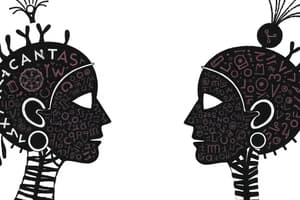Podcast
Questions and Answers
What is the primary goal of history as a discipline?
What is the primary goal of history as a discipline?
- To understand the relationship between economy and society
- To analyze different political systems
- To learn from past mistakes and prevent their recurrence (correct)
- To study the impact of culture on society
Which of the following is NOT a source used by historians to examine the past?
Which of the following is NOT a source used by historians to examine the past?
- Oral tradition
- Archaeological evidence
- Economic data (correct)
- Written records
What is the key objective of historical research?
What is the key objective of historical research?
- To make decisions affecting a population
- To analyze interactions among nations
- To predict future economic trends
- To uncover how different cultures have evolved over time (correct)
How do historians contribute to preventing future mistakes?
How do historians contribute to preventing future mistakes?
Which aspect is NOT a focus of historical examination?
Which aspect is NOT a focus of historical examination?
In essence, what do historians seek to achieve through their studies?
In essence, what do historians seek to achieve through their studies?
What is anthropology primarily concerned with?
What is anthropology primarily concerned with?
Which subfield of anthropology studies human behavior through the examination of artifacts and remains?
Which subfield of anthropology studies human behavior through the examination of artifacts and remains?
What is the main focus of psychology?
What is the main focus of psychology?
Which of the following is NOT a subfield of psychology mentioned in the text?
Which of the following is NOT a subfield of psychology mentioned in the text?
In what field did psychology have its roots before becoming more scientific?
In what field did psychology have its roots before becoming more scientific?
Which social science field has had significant influence on shaping other social science fields?
Which social science field has had significant influence on shaping other social science fields?
Flashcards are hidden until you start studying
Study Notes
Social Science - An Overview of Its Study and Subdisciplines
Social science is a broad field that encompasses many different studies involving human behavior and society. It consists of several subfields, each with its own focus and methodologies. Here we'll explore some of the main areas within social science, particularly history, which has had significant influence on shaping these fields.
Anthropology
Anthropology is one of the oldest social sciences, originating from European explorations and colonialism. It primarily concerns itself with the study of humans, past and present. This includes cultural anthropology, archaeology, and physical anthropology. Cultural anthropologists observe customs and traditions among societies around the world. Archaeologists study human behavior through the examination of artifacts and remains from past civilizations. Physical anthropology concerns itself with the biological aspect of humans, including diseases, physical traits, and evolutionary history.
Psychology
Psychology is concerned with understanding individual behaviors and mental processes. It includes subfields such as cognitive psychology (how people think), developmental psychology (stages of human growth), social psychology (group dynamics), clinical psychology (mental health treatment), and neuropsychology (brain function). This field has its roots in philosophy and biology but became more scientific with advances in experimental methodologies.
Sociology
Sociology focuses on groups and societies, particularly their organization, interaction, and change over time. Key areas within this discipline include cultural sociology (study of culture's impact on society), economic sociology (relationship between economy and society), and education (the role of schooling in society).
Political Science
Political science studies governments, political systems, political behavior, and international relations. Its key aspects include comparative politics (comparison between different political systems), public policy (making decisions affecting a population), and international relations (interactions among nations).
History
History examines the past through written records, oral tradition, archaeological evidence, and other sources. It aims to understand how different cultures have evolved over time and what factors influenced these changes. In essence, historians seek to learn from mistakes made in the past so that they may never be repeated.
Each of these fields contributes unique insights into humanity's collective experience. They often overlap or inform each other, providing rich context for understanding complex phenomena like warfare, economics, and social movements. As our world continues to evolve rapidly, these social sciences remain essential tools for comprehending where we've been, where we are now, and where we might go next.
Studying That Suits You
Use AI to generate personalized quizzes and flashcards to suit your learning preferences.




